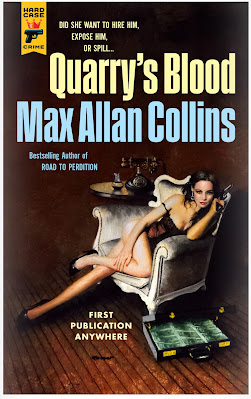We join Quarry in modern times at age 71. He’s a widower twice and living alone in a cabin during the tourist off-season. He has an adult daughter who is a successful true-crime author based in the Quad Cities that straddle the Mississippi River between Illinois and Iowa.
The novel also marks the return of an Asian-American female assassin named Lu who was introduced in Quarry’s Deal (aka The Dealer, 1976) and Killing Quarry (2020). For his part, the author does an admirable job of reminding the reader who Lu is. She’s a great partner for Old Man Quarry.
Quarry and Lu are dealing with two problems in this novel. First, hit men are trying to kill Quarry, and he needs to find out why and deal with the client who commissioned his murder. Second, Quarry’s true-crime writing daughter disappeared while researching an active serial killer case for a book.
Quarry and Lu basically serve as murderous detective partners investigating the serial murders in hopes of shedding light on the daughter’s disappearance. They are competent detectives and the solution to the paperback’s mysteries makes for a satisfying read. You can’t go wrong with a Quarry novel, and this one is a winner.
Despite that, you probably shouldn’t read Quarry’s Return without reading Killing Quarry and Quarry's Blood as the new novel is a direct sequel to the other "Old Man Quarry" paperbacks. Collins brings you up to speed just fine, so you won’t be lost, but why not read them in order? For that matter starting the four-book miniseries with Quarry’s Deal probably makes the most sense, but you’re certainly old enough to make your own decisions by now.
Solid novel. Solid series. Go buy them all HERE.
Open Letter to Max Allan Collins:
Big fan, here. Love the Quarry books best of all.
Not to bring up a touchy subject, but you’re 76 years old, and I can’t help but wonder how many more Quarry books you have in you. I hope there’s many more, but you’ve indicated you may be done with the series.
Mickey Spillane did you - and the reading public - a great service by allowing you to keep Mike Hammer alive in your excellent continuation novels. Any chance you can pay it forward by picking a young, talented author and allowing him to continue the Quarry stories (which have always been unstuck in time) after you’re gone?
It’s seems like a no-brainer and your fans will be able to enjoy new books in the series long after you’re gone. Or maybe the new books will suck, and everyone will spend an eternity talking about how you were the only one who could make Quarry work. Either way, you win.
Chew on it.




















